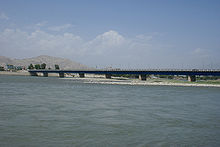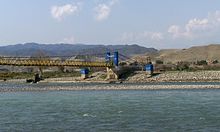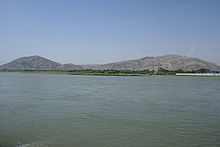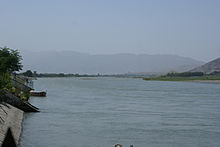- Kabul River
-
Kabul River (Persian: دریای کابل; Pashto: کابل سیند; Urdu: دریای کابل), the classical Cophes (
 /ˈkoʊfiːz/), is a 700 km long river that starts in the Sanglakh Range of the Hindu Kush Mountains in Afghanistan and ends in the Indus River near Attock, Pakistan. It is the main river in eastern Afghanistan and is separated from the watershed of the Helmand by the Unai Pass. It passes through the cities of Kabul, Chaharbagh and Jalalabad in Afghanistan before flowing into Pakistan some 25 km north of the Pak-Afghan Border crossing at Torkham. The major tributaries of the Kabul River are the Logar, Panjshir, Kunar, Alingar and Bara rivers.
/ˈkoʊfiːz/), is a 700 km long river that starts in the Sanglakh Range of the Hindu Kush Mountains in Afghanistan and ends in the Indus River near Attock, Pakistan. It is the main river in eastern Afghanistan and is separated from the watershed of the Helmand by the Unai Pass. It passes through the cities of Kabul, Chaharbagh and Jalalabad in Afghanistan before flowing into Pakistan some 25 km north of the Pak-Afghan Border crossing at Torkham. The major tributaries of the Kabul River are the Logar, Panjshir, Kunar, Alingar and Bara rivers.The Kabul River is little more than a trickle for most of the year, but swells in summer due to melting snows in the Hindu Kush Range. Its largest tributary is the Kunar River, which starts out as the Mastuj River, flowing from the Chiantar glacier in Chitral, Pakistan and after flowing south into Afghanistan it is met by the Bashgal river flowing from Nurestan. The Kunar meets the Kabul near Jalalabad. In spite of the Kunar carrying more water than the Kabul, the river continues as the Kabul River after this confluence, mainly for the political and historical significance of the name.
The Kabul River is impounded by Warsak Dam in Pakistan, which is situated approximately 20 km northwest of the city of Peshawar.
Contents
Kabul River in History
Expedition of Alexander the Great into Asia
In Arrian's "History of Expedition of Alexander the Great & conquest of Persia" Translated by Mr. Rooke, The River Kabul is referred to as Cophen. [1] [2] [3][4]
“ -Apr 329 - Cophen River (Kabul River, Afghanistan) ―Gandara- ” In Sanskrit & Avesta
The word Kubhā which is the ancient name of the river is both a Sanskrit and Avestan word. Alexander Cunningham derived it from the Scythian ku ("water").[5] Many of the rivers of Pakistan and Afghanistan are mentioned in the Rig Veda. The Sanskrit word later changed to Kābul.
“ The Kubha is the modern Kabul river which flows into the Indus a little above Attock and receives at Prang the joint flow of its tributaries the Swat (Swastu) and Gauri [6] ” “ In the older parts of the Rigved the Indian people appear to be settled on the north western border of India, in the Punjab and even beyond the Punjab on the borders of the Kubha river the Kowpher in Kabul. The gradual diffusion of these people from this point towards the east, beyond the Saraswati and Hindustan as far as the Ganges, can be traced almost step by step in the later portions of the Vedic writings.[7] ” Al Biruni
Biruni also called it "the River of Ghorwand".[8]
The Kabul River later gave its name to the region and eventually to the settlement of Kabul.[8]
See also
References
- ^ Arrian, John Rooke; "Arrian's History of the expedition of Alexander the Great: and conquest of Persia". J. Davis, 1813. http://books.google.com/books?id=dnwMAAAAYAAJ&pg=PA256&dq=Chronology+of+the+expedition+of+Alexander+the+Great+into+Asia&as_brr=3&client=firefox-a#v=onepage&q=Chronology%20of%20the%20expedition%20of%20Alexander%20the%20Great%20into%20Asia&f=false. Retrieved 2009-10-06.
- ^ Nigel Cawthorne; "Alexander the Great". Haus Publishing, 2004, ISBN 190434156X. http://books.google.com/books?id=oxyz0v9T74sC&pg=PA156&dq=Chronology+of+the+expedition+of+Alexander+the+Great+into+Asia&as_brr=3&client=firefox-a#v=onepage&q=&f=false. Retrieved 2009-10-06.
- ^ Waldemar Heckel; "The wars of Alexander the Great, 336-323 B.C". Taylor & Francis, 2003, ISBN 0415968550. http://books.google.com/books?id=DO6QMPLRiEUC&pg=PA13&dq=Chronology+of+the+expedition+of+Alexander+the+Great+into+Asia&as_brr=3&client=firefox-a#v=onepage&q=Chronology%20of%20the%20expedition%20of%20Alexander%20the%20Great%20into%20Asia&f=false. Retrieved 2009-10-06.
- ^ Arrian, James S. Romm, Pamela Mensch; "Alexander the Great: selections from Arrian, Diodorus, Plutarch, and Quintus Curtius". Hackett Publishing, 2005, ISBN 0872207277. http://books.google.com/books?id=Mi9rOaE3x6gC&pg=PR22&dq=Chronology++Alexander+the+Great&lr=&as_brr=3&client=firefox-a#v=onepage&q=Chronology%20%20Alexander%20the%20Great&f=false. Retrieved 2009-10-06.
- ^ Cunningham, Alexander. The Ancient Geography of India, p. 37. Trübner & Co. (London), 1871. Accessed 24 Sept 2011.
- ^ The History and Culture of the Indian People : The Vedic age. By Ramesh Chandra Majumdar, Achut Dattatrya Pusalker, A. K. Majumdar, Dilip Kumar Ghose, Bharatiya Vidya Bhavan, Vishvanath Govind Dighe Published by Bharatiya Vidya Bhavan, 1962 Page 247
- ^ Original Sanskrit Texts on the Origin and History of the People of India By John Muir page 352
- ^ a b Bosworth, C.E. (1999). "Kabul". Encyclopaedia of Islam (CD-ROM Edition v. 1.0 ed.). Leiden, The Netherlands: Koninklijke Brill NV.
Categories:- Tributaries of the Indus River
- Rivers of Afghanistan
- Rivers of Pakistan
- Geography of Khyber Pakhtunkhwa
- Kabul
- Rigvedic rivers
- Indus basin
- International rivers of Asia
Wikimedia Foundation. 2010.




